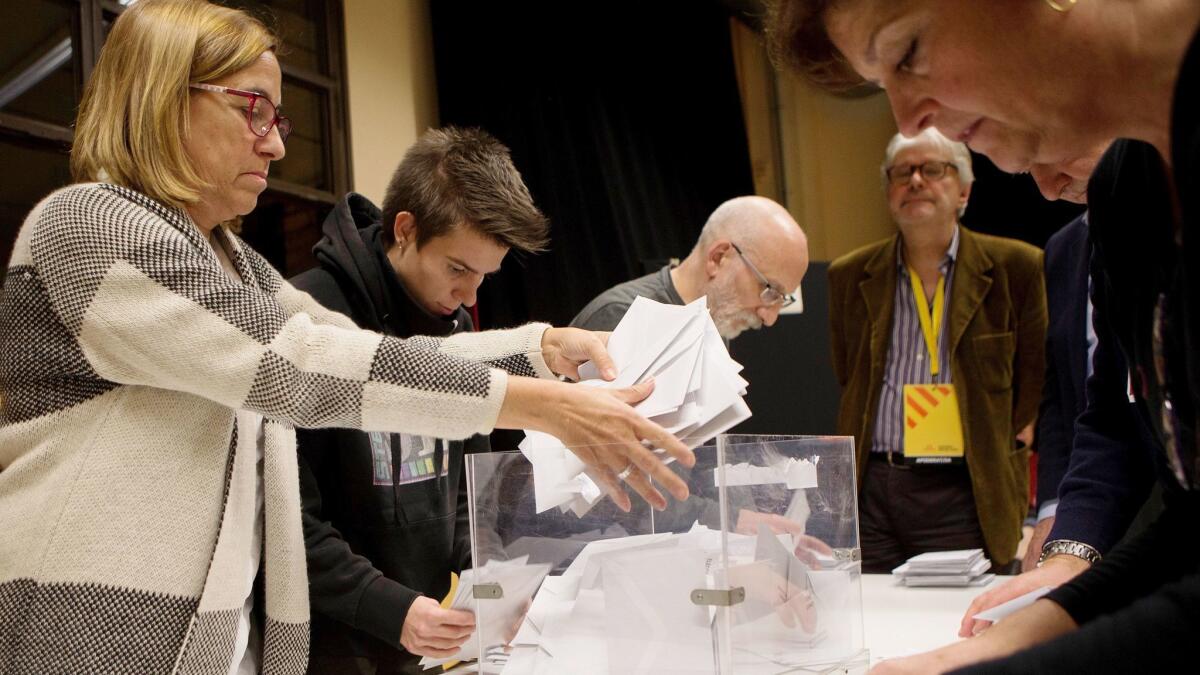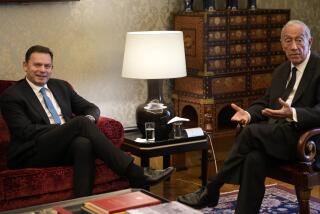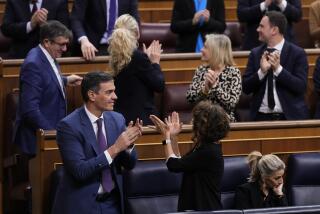Pro-independence parties in Spain’s Catalonia claim victory in regional elections as the country faces new turmoil

Pro-independence parties in Spain’s Catalonia region jubilantly claimed victory Thursday in regional parliamentary elections, throwing the country’s politics into new tumult and dealing a heavy blow to the Madrid government, which saw a backfiring of its bid to quell secessionist drive.
With more than 99% of the vote counted, unofficial results gave three separatist parties a 70-seat majority in the 135-member parliament — although in order to form a government, they will have to overcome internal bickering that has strained past coalitions.
And the party winning the largest number of votes on its own, the Citizens party, is staunchly opposed to breaking with Spain, pointing to deep divisions in Catalan society over the independence question.
Catalonia’s deposed separatist president, in self-exile in Belgium, declared the result a “slap in the face” for Spanish Prime Minister Mariano Rajoy.
“The Spanish state has been defeated,” said Carles Puigdemont, the ex-president.
Citizens party head Ines Arrimadas, however, signaled that efforts to derail a renewed independence push would continue. She vowed to “keep fighting for a peaceful co-existence, common sense and for a Catalonia for all Catalans.”
The vote — orderly and peaceful, unlike an independence referendum held in October over the objections of the central government in Madrid — pointed to a fractured electorate. The anti-independence Citizens party, or Cuidadanos, appeared to have won a plurality of 37 seats.
Two separatist parties — Junts Per Catalunya, or Together for Catalonia, and Esquerra Republicana or Republican Left — scored 34 and 32 seats, respectively. With four more seats from a smaller pro-secession party, Catalan Unity or CUP, that would give them a combined majority of 70 seats, but infighting could throw them off course to forming a coalition.
Fueled by an after-work surge of balloting, turnout was high, with more than 80% of the 5.5 million-member electorate casting ballots. Pre-election public opinion polls had pointed to a nearly even split among people favoring and opposing independence for the prosperous northeastern region.
Catalonia’s independence drive has triggered Spain’s deepest political crisis in decades. An October independence referendum — which was won by the secessionists, but with a turnout of less than half the eligible voters — was branded illegal by the central government in Madrid.
Rajoy, responded to the regional parliament’s unilateral independence declaration later that month by dissolving the Catalan government and calling new regional elections — the vote that took place Thursday.
In Barcelona, the region’s capital, Carmen Canut stood in line at her neighborhood school to cast a vote for Together for Catalonia.
“This is a historic moment,” Canut said. “I will fight to the end because Spain, for me, is not a democratic country.”
It was far from a normal election campaign. Puigdemont, stumped for votes from Belgium, where he fled in October, and it was not clear whether he could return without facing arrest.
Catalonia’s former vice president, Oriol Junqueras, campaigned from a jail near Madrid. He and other incarcerated separatist politicians could face charges of rebellion, sedition and misuse of public funds — making it physically difficult for the separatist bloc to convene.
Under the Spanish regional vote system, people vote for parties, not individual candidates, and the parties then allocate seats from their “lists” for the four-year parliamentary terms. Parties must win at least 3% of the vote to gain seats in the parliament.
With the balloting taking place on a weekday, a working day for most, some voters hurried in with only moments to spare. Emilio Carrillo, 32, scooted in after spending the day at his consulting job, voting for an anti-independence party.
Like many, he was frustrated over social issues and the economy taking a back seat to the secession question. “This is a distraction from other problems,” he said.
Even before voting began at 9 a.m., a long queue formed outside the Josep Maria Jujol school in the Barcelona neighborhood of Gracia, a pro-independence bastion.
Olga Navarro Pousa, 63, who was first in line, was going against neighborhood sentiment to cast her ballot for a pro-Spanish unity party.
Like many, Navarro mourned the political rifts that have split families and neighborhoods. “We were all friends here,” she said. “I want to return to what we were before.”
Others, including many young people, feared an independent Catalonia would be shunned by the European Union, to which they feel a strong attachment.
Ernesto Lopez Vallez, 21, arrived at his polling place wrapped in an EU flag, intending to vote for an anti-independence party because he wanted Catalonia to stay with Spain and thus remain part of the European Union.
A voting official asked Lopez to shed the flag. “I didn’t know the European Union was a political symbol,” he said.
European leaders have sided with the Madrid government in opposing Catalan independence, fearing that secession would galvanize other separatist movements across the continent.
Some voters at the school looked relieved and smiled after they dropped off their ballots. Others were simply in a rush to get to work, or later, hurrying to get home.
“There are so many people,” said Candy Expósito as she pushed through the crowd to leave for her human resources job. She voted for a pro-independence party.
The vote’s orderliness stood in contrast to the chaotic clashes that accompanied October’s referendum, leaving hundreds hurt. This time, all the candidates had called beforehand for calm.
Special correspondent Bernhard reported from Barcelona and staff writer King from Washington.
UPDATES:
4:35 p.m.: This article was updated with reaction from Catalan political leaders, analysis.
3:05 p.m.: This article was updated with early voting results, updated turnout.
11:50 a.m.: This article was updated with the close of polling, estimated turnout and details from the scene.
This article was originally published at 6:25 a.m.
More to Read
Start your day right
Sign up for Essential California for news, features and recommendations from the L.A. Times and beyond in your inbox six days a week.
You may occasionally receive promotional content from the Los Angeles Times.






